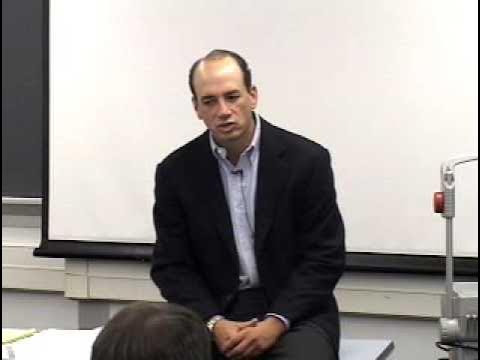Joel Greenblatt Columbia Lecture 2005 10 07

Summary of Joel Greenblatt Columbia Lecture 2005 10 07
Short Summary:
This lecture by Joel Greenblatt focuses on value investing, particularly the identification and analysis of undervalued companies. He emphasizes the importance of understanding a company's business model, its capital structure, and its management's track record. Greenblatt uses several examples from the Value Investors Club to illustrate his approach, highlighting the importance of finding companies with high returns on capital, low price-to-earnings ratios, and clear catalysts for growth. He also discusses the concept of "owner earnings" and the importance of considering a company's future incremental return on capital. Greenblatt argues that the efficient market hypothesis is flawed and that there are still opportunities for value investors to find undervalued companies, even in a large and competitive market. He encourages students to develop their own circle of competence and to focus on businesses they understand.
Detailed Summary:
1. Introduction and Overview (0:00 - 2:30)
- Greenblatt introduces the lecture, outlining the topics to be covered: investment ideas from the Value Investors Club, a Q&A session playing the role of Warren Buffett, and a discussion of the assignment due on the 26th.
- He emphasizes the importance of understanding investment theses and developing strong analytical skills.
2. Investment Ideas from the Value Investors Club (2:30 - 33:00)
- Greenblatt presents three investment ideas from the Value Investors Club, all written by Charlie 479, a successful investor who started his career in distress investing.
- NVR (June 2001): A homebuilder with a unique business model that pre-sells homes and uses land options to minimize capital expenditure. The thesis highlights the company's high returns on capital, low PE ratio, and resilience to downturns.
- Nii Holdings (November 2002): A wireless carrier in Mexico that emerged from bankruptcy with a strong business model and a low valuation. The thesis emphasizes the company's differentiated offering, fixed capital structure, and potential for growth.
- Sportsman's Guide (June 2003): A retailer of closeout merchandise that was migrating to the internet, offering a cheaper cost structure and growth opportunities. The thesis highlights the company's loyal customer base, low operating costs, and potential for expansion.
- Greenblatt encourages students to analyze these examples, focusing on the underlying themes and the thought process behind the investment theses.
3. Playing Warren Buffett (33:00 - 1:18:00)
- Greenblatt transitions to a Q&A session, playing the role of Warren Buffett and answering students' questions.
- Management: Greenblatt emphasizes the importance of evaluating management's track record and incentives. He highlights the importance of insider ownership and shareholder-oriented actions.
- Circle of Competence: Greenblatt discusses the importance of investing in businesses you understand, noting that Buffett avoids technology stocks due to his lack of understanding of the industry. He suggests that value investors can find opportunities in technology stocks when they are priced for free or at a significant discount.
- International Investing: Greenblatt acknowledges the potential for opportunities in international markets but highlights the challenges of navigating different laws, accounting standards, and cultural nuances. He emphasizes that he prefers to focus on the US market, where he feels most comfortable.
- Regulation: Greenblatt discusses the importance of considering regulatory risks, particularly in industries like healthcare and utilities. He suggests that investors should demand a larger margin of safety when investing in businesses with significant regulatory hurdles.
- Bad Businesses: Greenblatt shares his experience with Burlington Industries, a textile company that struggled to generate returns on capital due to a lack of barriers to entry and pricing power. He also shares his own worst investment, Key3 Media, a trade show company that failed to adapt to the changing technology landscape.
- Portfolio Strategy: Greenblatt emphasizes the importance of concentration, arguing that it is more prudent to invest in a few businesses you understand well than to diversify across a large number of companies. He uses the analogy of a real estate developer who would not invest equally in 30 different properties but would instead focus on a few carefully selected investments. He criticizes the use of standard deviations and volatility measures to assess risk, arguing that they are not relevant when you are truly buying a piece of a business.
4. Conclusion (1:18:00 - 1:27:00)
- Greenblatt reiterates the importance of value investing, emphasizing the potential for finding undervalued companies even in a large and competitive market.
- He encourages students to continue learning and to develop their own investment skills.
- He mentions his upcoming book, which will provide further evidence for the effectiveness of value investing strategies.
Notable Quotes:
- "A fat wallet is the enemy of superior investment returns."
- "I'd rather have bumpy 15% than a straight 12."
- "I am buying a piece of a business."
- "Garbage in, garbage out."
- "Mr. Market gets it right over the long term."
- "The only other concept I wanted to talk about... is owner earnings."
- "You're really looking for the 75 cents that's growing and not the 75 cents that's shrinking."
Processes and Methods:
- Investment Thesis Development: Greenblatt emphasizes the importance of clearly articulating an investment thesis, outlining the reasons why a company is undervalued and the potential catalysts for growth.
- Valuation Analysis: Greenblatt encourages students to use a variety of valuation methods, including EV analysis, return on tangible capital analysis, and comparable company analysis.
- Portfolio Construction: Greenblatt advocates for a concentrated portfolio strategy, focusing on a few carefully selected businesses that you understand well.
- Margin of Safety: Greenblatt stresses the importance of buying companies at a significant discount to their intrinsic value, providing a buffer against potential errors in your analysis.
- Long-Term Perspective: Greenblatt encourages investors to adopt a long-term perspective, recognizing that Mr. Market may be irrational in the short term but will eventually get it right.